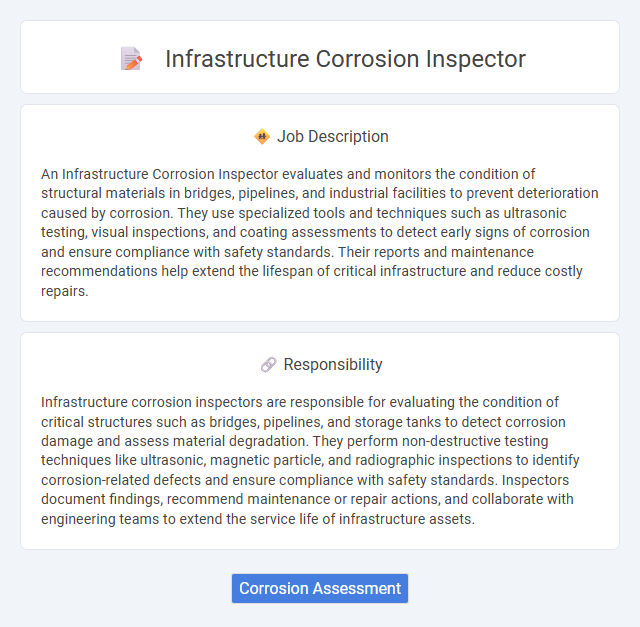
An Infrastructure Corrosion Inspector evaluates and monitors the condition of structural materials in bridges, pipelines, and industrial facilities to prevent deterioration caused by corrosion. They use specialized tools and techniques such as ultrasonic testing, visual inspections, and coating assessments to detect early signs of corrosion and ensure compliance with safety standards. Their reports and maintenance recommendations help extend the lifespan of critical infrastructure and reduce costly repairs.
Individuals with strong attention to detail and a background in engineering or materials science are likely to be suitable for an infrastructure corrosion inspector role. People who are comfortable working in various environments, including outdoors and potentially hazardous locations, have a higher probability of thriving in this job. Those who prefer repetitive administrative tasks or lack physical stamina may find this role challenging and less suitable for their skills and preferences.
Qualification
Infrastructure corrosion inspectors typically require a minimum of a high school diploma or equivalent, with many employers preferring candidates who hold a degree in materials science, engineering, or a related field. Certifications such as NACE Coating Inspector Level 1 or Level 2, or SSPC Coating Inspector Qualification, significantly enhance job qualifications by demonstrating specialized knowledge in corrosion prevention and control. Proficiency in using inspection tools like ultrasonic thickness gauges and knowledge of industry standards such as ASTM and ISO are essential for accurately assessing and reporting infrastructure integrity.
Responsibility
Infrastructure corrosion inspectors are responsible for evaluating the condition of critical structures such as bridges, pipelines, and storage tanks to detect corrosion damage and assess material degradation. They perform non-destructive testing techniques like ultrasonic, magnetic particle, and radiographic inspections to identify corrosion-related defects and ensure compliance with safety standards. Inspectors document findings, recommend maintenance or repair actions, and collaborate with engineering teams to extend the service life of infrastructure assets.
Benefit
Infrastructure corrosion inspectors likely provide significant benefits by identifying potential structural weaknesses before they lead to costly damages or failures. Their expertise probably helps extend the lifespan of critical infrastructure, enhancing safety and reducing long-term maintenance expenses. Employers may also benefit from reduced liability and improved regulatory compliance due to their thorough inspections.
Challenge
Infrastructure corrosion inspectors probably face significant challenges in identifying hidden corrosion in complex environments where access is limited. The job likely requires advanced knowledge of inspection techniques and specialized equipment to accurately assess the integrity of various materials under harsh conditions. Detecting early signs of corrosion could be crucial to preventing costly damage and ensuring long-term infrastructure safety.
Career Advancement
Infrastructure corrosion inspectors play a crucial role in assessing and preventing material degradation, ensuring structural integrity across industries such as oil and gas, transportation, and construction. Career advancement opportunities include senior inspector roles, corrosion engineering positions, and project management, often requiring certifications like NACE CIP or AC2. Gaining expertise in advanced inspection technologies and corrosion mitigation strategies significantly enhances prospects for leadership and specialized consultancy roles within the field.
Key Terms
Corrosion Assessment
Corrosion assessors play a critical role in extending the lifespan of infrastructure by conducting detailed inspections and evaluations of metal structures, pipelines, and industrial equipment. Utilizing advanced techniques such as ultrasonic testing, magnetic particle inspection, and corrosion rate analysis, these inspectors identify weaknesses and predict potential failures. Their comprehensive reports guide maintenance strategies and ensure compliance with safety and environmental standards.
 kuljobs.com
kuljobs.com